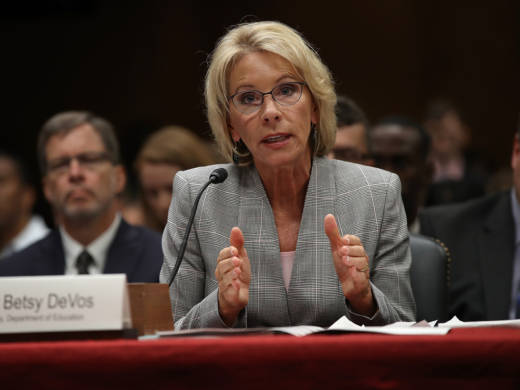Becerra said the Trump administration is "not above the law."
"When you’ve completed a process for enacting a law or regulation, then it must be implemented and obeyed," he said. "The Trump administration ... doesn't have a right to selectively decide which laws and regulations it will execute and which it will abandon."
The suit -- brought by California, 17 other states and the District of Columbia -- accuses DeVos of breaking federal law and giving free rein to for-profit colleges by rescinding the Borrower Defense Rule.
The suit asks a U.S. District Court to declare the Education Department's delay of the rule unlawful and to order the agency to implement it. The states say they have pursued "numerous costly and time-intensive investigations and enforcement actions against proprietary and for-profit schools" that violated consumer protection laws.
The Borrower Defense Rule was adopted by the Obama administration last November and had been set to take effect this month. It was created to make it "simpler for students at colleges found to be fraudulent to get their loans forgiven," as NPR's Ed team has reported.
Large amounts of money are potentially at stake. As the states' complaint notes, "taxpayers invested $32 billion in for-profit schools in the 2009-10 academic year, more than the annual budget of the U.S. Department of Justice and the U.S. Department of State during that time period."
The rule was put on hold in June, less than one month after DeVos said her agency would re-evaluate it. The states say DeVos moved too quickly to quash the rule and did so without public comment, particularly compared with the rule's genesis in public hearings that began in September 2015.
DeVos called her move a "regulatory reset" when she announced that the Department of Education would convene new public hearings on the rule that are scheduled to be held next week. The secretary said the rulemaking process had "missed an opportunity to get it right" and created "a muddled process."
The states in the new federal complaint disagree, saying that DeVos is trying to use a lawsuit filed by the California Association of Private Postsecondary Schools, a trade organization, as "a pretext" to avoid legal requirements for a federal notice and comment period.
"Since Day 1, Secretary DeVos has sided with for-profit school executives against students and families drowning in unaffordable student loans," Massachusetts Attorney General Maura Healey said in a news release about Thursday's court filing. "Her decision to cancel vital protections for students and taxpayers is a betrayal of her office's responsibility and a violation of federal law. We call on Secretary DeVos and the U.S. Department of Education to restore these rules immediately."
The Borrower Defense Rule was negotiated after two large for-profit chains — Corinthian Colleges and the ITT Technical Institute — shut down hundreds of campuses following regulatory crackdowns in recent years. The rule would allow borrowers to have their loans forgiven if a state has successfully taken action against a for-profit school.
"Nearly 16,000 borrower defense claims are currently being processed," the Education Department said last month. Despite the postponement, DeVos said, "promises made to students under the current rule will be promises kept." She added, "Some borrowers should expect to obtain discharges within the next several weeks."
In addition to providing relief for students, the rule would also empower the Department of Education to seek money from schools where loans were forgiven.
"For-profit schools receive the vast majority of their revenue from the federal government in the form of federal student loans and grants," the civil complaint notes. "In 2009, the 15 publicly traded for-profit education companies received 86 percent of their revenues from taxpayer-funded loans."
The attorneys general who filed the lawsuit are from California, Connecticut, Delaware, Hawaii, Iowa, Illinois, Maryland, Massachusetts, Minnesota, New Mexico, New York, North Carolina, Oregon, Pennsylvania, Rhode Island, Vermont, Virginia, Washington and the District of Columbia.
"These rules served as critical protections against predatory for-profit schools that exploit hard-working students — students who are simply trying to invest in their own education and future," said New York Attorney General Eric Schneiderman. "When Washington abdicates its responsibility to protect New Yorkers, we won't hesitate to step in."
This post includes reporting by KQED's Marisa Lagos.
Copyright 2017 NPR. To see more, visit http://www.npr.org/.
9(MDAxOTAwOTE4MDEyMTkxMDAzNjczZDljZA004))

9(MDAxOTAwOTE4MDEyMTkxMDAzNjczZDljZA004))